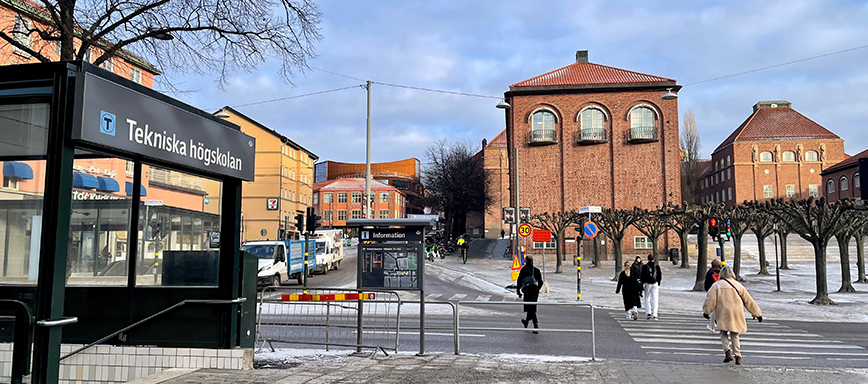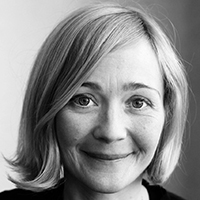Research in between educational and technical history

Lina Rahm is a new Assistant Professor at the Division of History of Science, Technology and Environment. Her research focuses on the intersection between sociotechnical and educational imaginaries.
Lina Rahm's research extends from the 1950s to the present day and points to the important convergence between educational science, environmental humanities, technical studies, and historical studies.

– I have always thought that higher education and knowledge are so fascinating and important in themselves. I'm young academically but not in age, so I did other things before I started my doctorate. I have worked for ten years at a regional theater in Östergötland, with children and youth theater.
Curiosity grew across Valhallavägen
Lina currently lives in Norrköping but comes from Stockholm. Already when she went to primary school, which is located on the other side of Valhallavägen, she looked across the street and thought that KTH seemed to be an exciting place to work. After she defended her dissertation in pedagogy, her interest grew regarding the department of historical studies.
– I have just started as an assistant professor in a department that I have been interested in ever since I started my doctorate. I read a lot of the research that came from the Department of Philosophy and History. I truly believe that our pressing societal problems must be tackled interdisciplinary in a rich environment where different fields meet.
Before Lina Rahm started as an assistant professor, she was a postdoctoral fellow on a stipend from the physicist Ragnar Holm foundation. Lina Rahm's ongoing project within WASP-HS is about environmental humanistic studies of epistemic notions of, and educational initiatives around, AI and autonomous systems.
– How do you educate citizens when you think that new technology is socially transformative? This is an issue I will continue to investigate. I will also look at how political notions about AI, education, and the environment overlap. When we think of education, we often think of children's education and higher education, but now it seems that all citizens need new knowledge. What knowledge is presented as important, for whom, and why?
Lifelong learning
Knowledge, she says, is not something that is intended at the beginning of life, but is something we gather and revise throughout life.
– The school and education systems change according to how we envisage the technical future. At KTH, lifelong learning is a central part of KTH's activities and it is seen as more important than ever. We do not become fully educated, but must continue to re-learn and learn anew as the world becomes more and more complex.
And how do you educate the population? What do we count as valid knowledge and how should they get that knowledge? These are questions that Lina finds important, and she claims that there are political and social problems where education is recurrently seen as a taken-for-granted solution.
– It's not just about new skills, but maybe we need to become a new kind of person to adapt to the world of the future where AI and autonomous systems are constantly present and reshape practices and decisions.
Contribute to a more just society
Other questions that Lina Rahm asks concern the transfer of the citizen's responsibility. For example, how do we get better at acquiring "digital mindset", and how does one learn it? What are the inclusions and exclusions in such calls? Lina also emphasizes that education and knowledge are always permeated by power relations and her background in gender studies shines through here.
– I believe that education and new knowledge are often seen as something good and unproblematic. Knowledge is seen as something inclusive and fair in itself, but education is linked to, for example, ethnicity, class, and other power systems and we must problematize education about technology to create a more open and fair society. Education must have a higher purpose than adapting people to an imagined future, it is important to create a better world, and to do that we need to put education and knowledge production under critical scrutiny.
Lina also points out that critical researchers can sometimes be painted as kill-joys, a portrayal she does not agree with.
– What happens does not just appear from the top down, but boils in different places and must be taken seriously. Critical perspectives shed light on power symmetries and thus stimulate questioning and, by extension, more just societies. Research is something we do together by highlighting, criticizing, questioning, and challenging, for example by pointing out alternatives and proposing more equitable solutions. We need to learn from each other and learn across borders to come up with relevant social research.
Text: Hanna Kalla
This is the 26th article in the School of Architecture and the Built Environment 's series of articles on selected research, education or collaboration initiatives from each department. You can find the previous articles here: Archive
